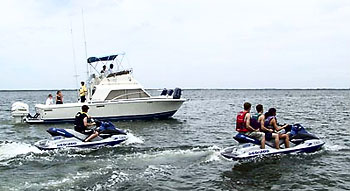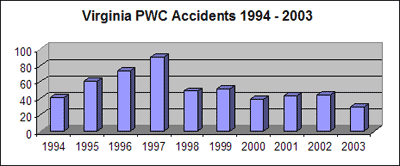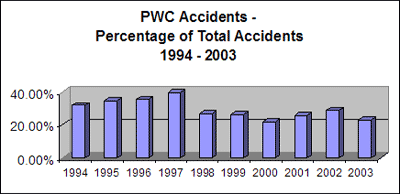 PWC stands for personal watercraft with an emphasis on the personal. Trade name craft, such as Ski-Doo® (Bombardier Recreational Products), Waverunner® (Yamaha Motor Corporation, USA), and JET SKI® (Kawasaki Motors Corp., USA) are types of PWC. Personal watercraft are defined as motorboats less than 16 feet in length that are powered by jet pumps, not propellers, where the persons stand, kneel, or sit on, rather than inside the boat. PWCs are operated by one person, and often have seating space for others. Some models have seating for up to four riders (including the operator).
PWC stands for personal watercraft with an emphasis on the personal. Trade name craft, such as Ski-Doo® (Bombardier Recreational Products), Waverunner® (Yamaha Motor Corporation, USA), and JET SKI® (Kawasaki Motors Corp., USA) are types of PWC. Personal watercraft are defined as motorboats less than 16 feet in length that are powered by jet pumps, not propellers, where the persons stand, kneel, or sit on, rather than inside the boat. PWCs are operated by one person, and often have seating space for others. Some models have seating for up to four riders (including the operator).
PWC Education Requirement
As of July 1, 2009, all PWC operators ages 20 and younger must complete a boater safety course. This is the beginning of the phase-in for all Virginia boaters:
- PWC operators between the ages of 16 and 20 years of age or younger shall meet the requirements by July 1, 2009, operators ages 14 or 15 may operate a PWC if they have successfully completed an approved boating education safety course;
- PWC operators 35 years of age or younger shall meet the requirements by July 1, 2010;
- PWC operators 50 years of age or younger and motorboat operators 20 years of age or younger shall meet the requirements by July 1, 2011;
- All PWC operators, regardless of age, and motorboat operators 30 years of age or younger shall meet the requirements by July 1, 2012;
- Motorboat operators 40 years of age or younger shall meet the requirements by July 1, 2013;
- Motorboat operators 45 years of age or younger shall meet the requirements by July 1, 2014;
- Motorboat operators 50 years of age or younger shall meet the requirements by July 1, 2015;
- All motorboat operators, regardless of age, shall meet the requirements by July 1, 2016.
Click here for information about meeting this requirement »
PWC Safety
PWCs are a great deal of fun because of their maneuverability and power. It is for these same reasons that PWC can be dangerous if not operated responsibly. The potential for danger is illustrated in the 2003 boating accidents in Virginia showing that although PWCs comprise just over 10% of all registered boats, they were involved in 22.6% of all boating accidents. As a fast growing segment of boating, both in Virginia and the nation, personal watercraft operators need to become more safety conscious through personal responsibility. The word “personal” in personal watercraft is focused on the operator’s independent decision to act responsibly. Safe PWC operation requires quick and responsible decisions based on mature judgment.
With the decision to operate the PWC responsibly, there are several essential pieces of information you should remember to keep your ride safe. Some of the information deals strictly with the boat’s mechanics. Other information is common sense, and the rest of the details include the laws. First, let’s look at operation logistics.

Although PWC are involved in a disproportionate number of boating accidents (property damage and personal injury), they have a great safety record when it comes to boating fatalities. The main reason for low fatality rates on PWC is because all PWC operators, passengers, and persons being towed by a PWC, are required to wear a U.S. Coast Guard approved life jacket. Other boat operators and passengers are only required to have wearable life jackets on board, but are not required to wear them. The use of high-impact life jackets by PWC operators and passengers is encouraged as the high-impact types have more straps on the PFD vest to hold it on during a sudden spill into the water at high speeds. Also, the jet-drive propulsion is safer than a propeller motor. However, the jet drive intake will attract loose items and pull them through the jet drive much like a vacuum. Items that are too large to enter the intake area will be held against the intake grates until the engine is turned off. Common sense tells us to keep the area near the water intake free of obstructions. Obstructions might include sand, stones, seaweed, or such things as clothing, straps, fishing line, plastic bags, and even long hair. The jet intake is powerful and will suck anything into its impeller, damaging the pump.
Another part of the PWC that simultaneously provides advantages and disadvantages to the operator is the steering. PWC are highly maneuverable which makes them so appealing to ride. An operator can accelerate quickly with a slight movement of the throttle, making the ride exciting. At the same time, the throttle can be a hindrance. For instance, steering control is lost when the throttle is released or when the engine is turned off. This is extremely important to remember when trying to maneuver around an obstacle in the water. It is imperative to keep the engine running if you need to turn, even slightly. Responsible operators who understand the handling of their PWC avoid collisions with docks, swimmers and other boats. Some of the newer models are equipped with rudders. The addition of the rudders helps steer the craft when there is no propulsion.
You may be operating a PWC with a lanyard cut-off switch that is attached to the PWC on one end and to yourself on the other end. Attaching it to you and the PWC is a legal requirement for operation. All recent models have lanyard cutoff switches, and, with this switch the engine will stop if you fall off of the craft. As a PWC operator, you will be riding on the hull of the boat with no gunwales to hold you in. Because of this, you are more likely to fall overboard. Taking sharp turns at fast speeds will tilt the PWC and possibly dump you off. Falling off of the PWC will cause the lanyard cut-off switch to disconnect, stopping the PWC and allowing you to climb back on again. This is a great built-in safety feature. Hopefully, by using good, boat-safety judgment and slowing your speed to turn, you can avoid taking advantage of this feature.

Although a lack of knowledge about how a PWC operates contributes to some PWC accidents, most accidents are caused by the operator’s inexperience, inattention or failure to look out for hazards, swimmers or other boaters. Operators should take this responsibility personally by challenging themselves to learn as much as possible about their craft and staying alert during operation. They should continuously scan the water, especially to check the area behind their PWC before making any turns. In combination with general boating, stressors (wind, sun glare, heat, vibration, etc.), the operator’s tense eye muscles and eye fatigue will contribute to the development of temporary tunnel vision, known as “boater’s hypnosis.” This is when the operator stares straight ahead in a trance, without looking to the periphery for approaching boats or obstacles. Shorter rides with frequent rests will help alleviate boater’s hypnosis. Again, it’s the operator’s responsibility to know when to call it a day.
Excessive speed caused or contributed to several accidents last year. Manufacturers are making PWCs that can reach speeds of 65-70 mph. Operators should keep their speed under control and not try to test the limit. Traveling at faster speeds amplifies everything, including tunnel vision, the potential for injury and less reaction time. Commit yourself to exercise caution and only travel in areas free of hazards and at speeds that keep you in control. Some localities may post speed requirements, such as “no wake” zones, where creating any wake could be damaging to either property or people. Please learn the local rules and keep your speed under control. All PWC must come to no wake speed when within 50-feet or less of piers, docks, boathouses, boat ramps, people in the water and any other type of vessel, except another PWC.
Every operator should have both the physical capability and the mature judgment needed to operate the watercraft safely. Mature judgment comes with experience and age. For some operators, the temptation to jump wakes or sneak between boats is difficult to resist. The operator with mature judgment will recognize these situations as extremely dangerous. Besides not knowing which direction the other operator may decide to go, large ships and barges will not be able to stop quickly. Remember, boats don’t have brakes. Never jump wakes, and never cut in front of another boat. Being responsible means staying alert, making safety-conscious decisions and operating the PWC defensively. It’s better to be a safe operator who is alive than to regret your misjudgment after an accident, an injury, or worse.
Keeping safety a priority will prevent most PWC accidents. To ensure other safe practices, Virginia has specific laws for personal watercraft operation. Our Virginia Game Wardens enforce these laws. Listed below are the specific PWC laws:
Restrictions on Operation
It shall be unlawful for any person to:
- Operate a personal watercraft unless he is at least sixteen years of age, except any person fourteen or fifteen years of age shall be allowed to operate a personal watercraft if he (i) has successfully completed a boating safety education course approved by the Director and (ii) carries on his person, while operating a personal watercraft, proof of successful completion of such course. Upon the request of a law-enforcement officer, such person shall provide proof of having successfully completed an approved course;
- Beginning July 1, 2009, other PWC operators will need to comply with our boating safety education requirement.
- Operate a personal watercraft unless each person riding on the personal watercraft is wearing a type I, type II, type III, or type V personal flotation device approved by the United State Coast Guard; Inflatable life jackets are prohibited.
- Fail to attach the lanyard to his person, clothing, or personal flotation device, if the personal watercraft is equipped with a lanyard-type engine cut-off switch;
- Operate a personal watercraft on the waters of the Commonwealth between sunset and sunrise;
- Operate a personal watercraft while carrying a number of passengers in excess of the number for which the craft was designed by the manufacturer; or Operate a personal watercraft in excess of the slowest possible speed required to maintain steerage and headway within fifty feet of docks, piers, boathouses, boat ramps, people in the water, and vessels other than personal watercraft. Nothing in this section shall prohibit a personal watercraft from towing a person with a rope less than fifty feet in length.
Note: The above provisions do not apply to participants in regattas, races, marine parades, tournament or exhibitions approved by the Board of the Department of Wildlife Resources or the United States Coast Guard.
Reckless Operation
A person shall be guilty of reckless operation who operates any personal watercraft recklessly or at a speed or in such a manner as to endanger the life, limb or property of any person, which shall include, but not be limited to:
- weaving through vessels that are underway, stopped, moored or at anchor while exceeding a reasonable speed under the circumstances and traffic conditions existing at the time;
- following another vessel or person on water skis or similar device, crossing the path of another vessel, or jumping the wake of another vessel more closely than is reasonable and prudent, having due regard to the speed of both vessels and the traffic on and the condition of the waters at the time;
- crossing between the towing vessel and a person on water skis or other device; or
- steering toward an object or person and turning sharply in close proximity to such object or person in order to spray or attempt to spray the object or person with the wash or jet spray of the personal watercraft.
Anyone who can reach the throttle, such as children under 14 years of age, may seem physically able to operate a personal watercraft. But, the law states that operators must be at least 16 years old, or 14 or 15 years old with proof of boater education carried onboard, to operate a PWC. These operators, whether 14 or 40, are expected to make wise decisions, for injuries will only be avoided when the operator is educated about the craft, knows the rules of the water and has the ability to make safe decisions based on all present variables, past experience and consideration of possible consequences.
The Virginia Department of Wildlife Resources encourages all potential operators to take a safe boating course prior to independent operation, especially those with limited boating experience. Safe operation of a PWC must be a conscious decision after learning the facts. The true meaning of PWC is personal responsibility. Help make this year a personal-watercraft-safe year by not being a part of the accident or fatality picture.
Be Responsible! Be Safe! Have Fun! Or, more appropriately, to have fun, you must act responsibly and be safe.

